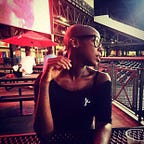It’s Time for A Mainstream Black Gay Hip-Hop Artist
Remember that time when the hip-hop industry said, “Let’s just get rid of all homophobia and allow gay artists to be who they are?”
Yeah, me neither.
Still, this mentality remains long overdue. If hip-hop is nothing else, it is a reflection of contemporary Black culture — a musical diary of what life is like for so many of us in this country. Presently, hip-hop looks like a mirror decorated with cracks and smudges.
Being gay, however, should be considered neither a crack nor smudge, but Black people are still uncomfortable with addressing the issue of being gay in our community. Mothers are still abandoning their lesbian daughters. Black men are still trying to beat the gay out of their sons.
Hip-hop’s homophobia is rather interesting.
Women kissing women is tolerable because it ties into male sexual fantasy. Men showing open affection towards men, on the other hand, is frowned upon as anti-masculine in a climate in which men want to be looked at as conquerors of everything from stages to women.
But what if hip-hop evolved? What if hip-hop was open to gay men? What if one of the biggest names in hip-hop announced he was gay? Would it be good or bad for the culture?
It could only be good.
Here are five reasons why:
1. The Youth.
More and more Black men are unapologetically declaring their gay statuses at earlier ages. Like heterosexuals, they too enjoy lyrics by mainstream artists such as Drake and Kanye. Like heterosexuals, they too would like to enjoy lyrics that speak directly to their experiences. If hip-hop wants to remain the narrative of Black urban youth, then it needs to incorporate all of its stories.
2. The Artists.
Our society is filled with men who are petrified of publicly declaring or displaying their homosexuality out of fear of economic backlash. There are doctors who hide their sexuality fearing the loss of patients. So it should come as no surprise that there are male hip-hop artists exhibiting this same behavior. Kryptonite for any artist — regardless of genre — is the stifling of expression. Creative people live for outlets. Not being able to freely express their romantic feelings is maddening, especially when the price to pay is the artist’s career.
3. The Business.
From a business perspective, an openly gay mainstream male hip-hop artist would be a cultural dynamo.
Think of everything that comes with gay culture:
Balls (dancing, that is), venues, parties, fashion, parades.
Now combine that with hip-hop culture:
Dance crews, rap battles, beatboxing, music.
Think of the marketing and economics courses that would start popping up in colleges. It would revolutionize interdisciplinary scholarship.
4. The Black Narrative.
While it would he wonderful to assume people are able to think beyond what mainstream media highlights, the fact is many do not. Currently, mainstream hip-hop is dominated by Black men singing about drugs, girls, stuntin’, and haters. Adding a mainstream gay male artist to the mix would introduce global ears to an aspect of the Black experience not often discussed.
5. The Gay Black Male Narrative.
Presently, the concept of the gay male is marginalized to predominantly White television channels such as Logo or shows such as Will & Grace and whatever Ryan Murphy decides to throw into American Horror Story. The Black gay male experience seems to be dominated by figures such as RuPaul and Laverne Cox. Not all gay Black men wear dresses. Not all gay Black men are effeminate. Allowing different gay Black male mainstream hip-hop artists to express themselves educates people outside of the community.
Hip-hop has evolved over the years, but only as far as homophobia has allowed.
It is no secret that there are men in the industry who are dying to be themselves, who want nothing more than to rip away the hypermasculine, woman-conquering veil they are forced to put on just to maintain a certain lifestyle. I often question how many popular hip-hop artists we love who clearly have drug problems are struggling with this. How many are being forced to put on this persona of playboy when they have no interest in women whatsoever? How much of this bottle and pill popping is a coping mechanism for a truth they can’t reveal?
Dear hip-hop,
You used to be known for keeping it street. Well, the streets have been talking. It just doesn’t seem like you want to listen.
Let’s change that.
